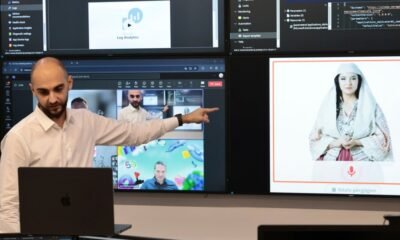A simple AI model has been shown to perform on a par with experienced dermatologists when assessing the aggressiveness of a common form of skin cancer, squamous cell carcinoma. The research was headed by the University of Gothenburg.
Each year, more than 10,000 Swedes develop squamous cell carcinoma. This is the second most common form of skin cancer in Sweden, after basal cell carcinoma, and its prevalence is increasing rapidly. Squamous cell carcinoma often develops in the head and neck region and other areas exposed to the sun over many years.
“This type of cancer, which is a result of mutations of the most common cell type in the top layer of the skin, is strongly linked to accumulated UV radiation over time. It develops in sun-exposed areas, often on skin already showing signs of sun damage, with rough scaly patches, uneven pigmentation, and decreased elasticity,” says associate professor and dermatologist Sam Polesie, who led the study.
Squamous cell carcinoma diagnosis is often easy – the challenge lies in the preoperative assessment – determining how aggressively the tumor is growing to plan and prioritize surgery appropriately. If the tumor is more aggressive, the surgery needs to be scheduled promptly, with more adjacent tissue removed. For less aggressive tumors, narrower margins can be used, with simpler procedures sufficient in some cases.
Almost identical performance
In many countries, Sweden included, preoperative punch biopsies are not routinely performed for suspected squamous cell carcinoma. Surgery is instead carried out based solely on the clinical suspicion of a tumor, with the entire excised specimen sent for histopathological analysis. The fact that surgery is performed without a preoperative biopsy underscores the need for assessment alternatives that do not require tissue samples, such as image analysis using artificial intelligence (AI).
For the study, the researchers trained an AI system in image analysis using 1,829 clinical close-up images of confirmed squamous cell carcinoma. The AI model’s ability to distinguish three levels of tumor aggressiveness was then tested on 300 images and compared with the assessments of seven independent experienced dermatologists.
The results, published in the Journal of the American Academy of Dermatology International, show that the AI model performed almost identically to the team of medical experts. At the same time, agreement between individual dermatologist assessments was only moderate, underscoring the complexity of the task.
Two clinical features – ulcerated and flat skin surfaces – were found to be clearly associated with more aggressive tumor growth. Tumors exhibiting these characteristics were more than twice as likely to fall into one of the two higher levels of aggressiveness.
Healthcare needs should decide
The use of artificial intelligence in skin cancer care has attracted a great deal of interest in recent years, although according to Sam Polesie, so far it has had limited practical impact within healthcare. He emphasizes the importance of clearly defined application areas where research can create added value for Swedish healthcare.
We believe that one such application area could be the preoperative assessment of suspected skin cancers, where more nuanced conclusions can influence decisions. The model we’ve developed needs further refinement and testing, but the way forward is clear – AI should be integrated where it actually adds value to decision-making processes within healthcare.”
Sam Polesie, associate professor and dermatologist
Sam Polesie is an associate professor of dermatology and venereology at the University of Gothenburg and a practicing dermatologist at Sahlgrenska University Hospital. The images comprising the study data were taken within dermatological healthcare at the university hospital between 2015 and 2023.
Source:
Journal reference:
Liang, V., et al. (2025). Assessing differentiation in cutaneous squamous cell carcinoma: A machine learning approach. JAAD International. doi.org/10.1016/j.jdin.2025.07.004











































